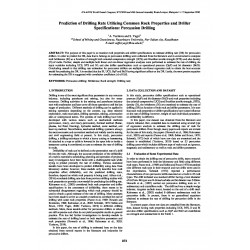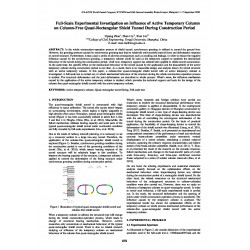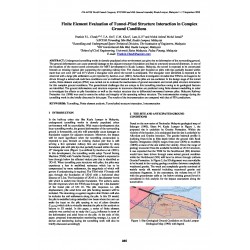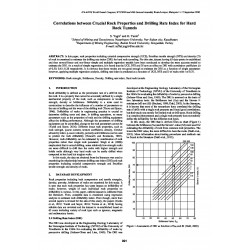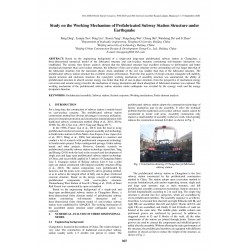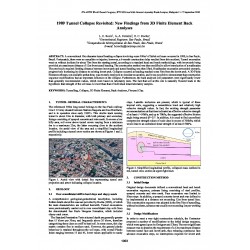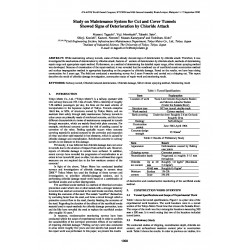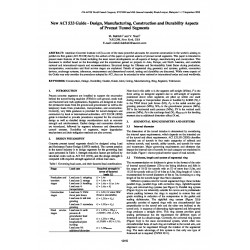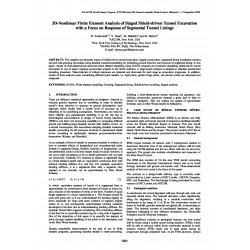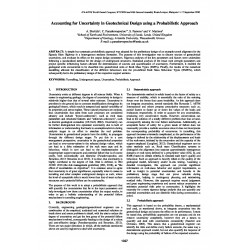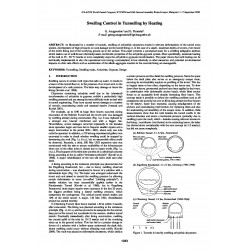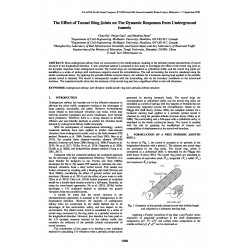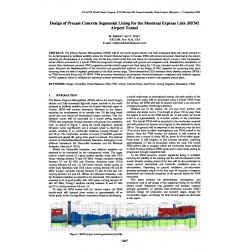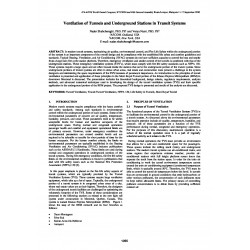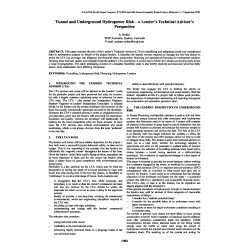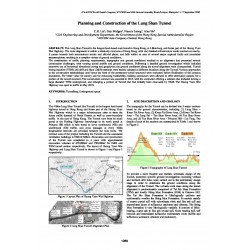No document
Search & filter
Search for a publication
Search & filter
World Tunnelling Congress
WTCThere are 1984 documents.
-
Prediction of Drilling Rate Utilizing Common Rock Properties and Driller Specifications: Percussion Drilling
Abstract: The purpose of this paper is to examine rock properties and driller specifications to estimate drilling rate (DR) for percussion drillers. In order to predict the DR, data that is belongs to percussion drilling were collected from the literature and re-constructed to compute rock brittleness (BI) as a function of strength both uniaxial compressive strength (UCS) and Brazilian tensile strength...
0,00 € -
Full-Scale Experimental Investigation on Influence of Active Temporary Column on Column-Free QuasiRectangular Shield...
Abstract: In the whole construction-operation process of shield tunnel, synchronous grouting is utilized to control the ground loss. However, the grouting pressure caused by synchronous grouting may lead to relatively unfavourable internal force and deformation response on tunnel structure. Furthermore, it may cause a series of adverse consequences such as cracking and leakage. In order to reduce the...
0,00 € -
Finite Element Evaluation of Tunnel-Piled Structure Interaction in Complex Ground Conditions
Abstract: Underground tunnelling works in densely populated urban environment can give rise to deformation of the surrounding ground. The ground deformations can cause potential damage to the adjacent structure foundation and lead to untoward structural distresses. In one of the locations of the recent tunnel construction for MRT development in Kuala Lumpur, Malaysia, the tunnel is expected to be...
0,00 € -
Correlations between Crucial Rock Properties and Drilling Rate Index for Hard Rock Tunnels
Abstract: In this paper, rock properties including uniaxial compressive strength (UCS), Brazilian tensile strength (BTS) and density (D) of rock is examined to estimate the drilling rate index (DRI) for hard rock tunneling. For this aim, dataset having 63 data-points is established and then several linear and non-linear simple and multiple regression models have been conducted to develop the most...
0,00 € -
Study on the Working Mechanism of Prefabricated Subway Station Structure under Earthquake
Abstract: Based on the engineering background of a single-arch large-span prefabricated subway station in Changchun, a three-dimensional numerical model of the fabricated structure and cast-in-place structure considering soil-structure interaction was established. The seismic time history analysis showed that the fabricated structure had excellent resistance to deformation and better mechanical...
0,00 € -
1989 Tunnel Collapse Revisited: New Findings from 3D Finite Element Back Analyses
Abstract: A conventional 10m diameter tunnel heading collapse involving some 300m³ of failed soil mass occurred in 1989, in Sao Paulo, Brazil. Fortunately, there were no casualties or injuries; however, a 6-month construction delay resulted from this accident. Tunnel excavation went on without incident for about 70m from the starting portal, according to a standard head and bench methodology, with invert...
0,00 € -
Study on Maintenance System for Cut and Cover Tunnels Showed Signs of Deterioration by Chloride Attack
Abstract: While maintaining subway tunnels, some of them already showed signs of deterioration by chloride attack. Therefore, it was investigated the mechanism of deterioration by chloride attack, features of sections of deterioration by chloride attack, methods of determining repair range and appropriate repair method. Furthermore, as a method of determining the detailed repair range, silver nitrate...
0,00 € -
New ACI 533 Guide - Design, Manufacturing, Construction and Durability Aspects of Precast Tunnel Segments
Abstract: American Concrete Institute (ACI) as one of the most powerful advocates for concrete construction in the world is aiming to publish its first guide (ACI 533.5R) led by the authors of this paper on general aspects of precast tunnel segments. This paper is intended to present main features of the Guide including the most recent developments on all aspects of design, manufacturing and...
0,00 € -
3D-Nonlinear Finite Element Analysis of Staged Shield-driven Tunnel Excavation with a Focus on Response of Segmental...
Abstract: The complex and dynamic nature of shield-driven tunnel excavation, staged construction, segmental lining installation process, and tail-void grouting necessitate using detailed numerical modeling for predicting ground behavior and response of segmental lining. In this paper, results of three-dimensional advanced finite element modeling using DIANA program are presented simulating shield-driven...
0,00 € -
Accounting for Uncertainty in Geotechnical Design using a Probabilistic Approach
Abstract: A simple but systematic probabilistic approach was adopted for the preliminary design of an example tunnel alignment for the Egnatia Odos Highway in a heterogenous molasse formation. The purpose of this investigation was to discern sources of geotechnical uncertainty, and evaluate its effect on the output design parameters. Rigorous analyses of the key parameters and factors were undertaken...
0,00 € -
Swelling Control in Tunnelling by Heating
Abstract: As illustrated by a number of tunnels, swelling of anhydritic claystones results in relevant deformations of the tunnel cross section, development of high pressures on (and damage to) the tunnel lining or, in the case of a small - moderate depths of covers, even heave of the entire lining and of the overlying ground up to the surface. This paper presents a conceptual study for a swelling...
0,00 € -
The Effect of Tunnel Ring Joints on the Dynamic Responses from Underground Tunnels
Abstract: Most underground railway lines are constructed by the shield method, resulting in the periodic jointed characteristic of tunnel structure in the longitudinal direction. A new analytical method is proposed in this study to investigate the effect of the tunnel ring joint on the dynamic responses from underground tunnels. The tunnel rings are conceptualized as cylindrical shells, and the tunnel...
0,00 € -
Design of Precast Concrete Segmental Lining for the Montreal Express Link (REM) Airport Tunnel
Abstract: The Réseau Express Métropolitain (REM) will be the fourth largest electric and fully-automated light-rail transit network in the world designed to facilitate mobility across the Greater Montreal region in Canada. REM will connect downtown Montreal to the airport, requiring the development of an entirely new 3.6 km long bored tunnel that runs below the international airport runways. This...
0,00 € -
Ventilation of Tunnels and Underground Stations in Transit Systems
Abstract: In modern transit systems, maintaining air quality, environmental control, and Fire Life Safety within the underground portion of the system is an important component of the overall design and its compliance with the established life safety and comfort guidelines and standards. Typical Heating, Ventilation, and Air Conditioning (HVAC) systems do not have sufficient capacity to control the heat...
0,00 € -
Tunnel and Underground Hydropower Risk - a Lender’s Technical Advisor’s Perspective
Abstract: This paper explores the role of the Lender’s Technical Advisor (LTA) in identifying and mitigating tunnel and underground risks in hydropower projects on behalf of the project lenders. It describes the typical services required to manage the four key phases in which the LTA has coverage: due diligence, pre-financial close, construction financing and operational financing for hydropower...
0,00 € -
Planning and Construction of the Lung Shan Tunnel
Abstract: The Lung Shan Tunnel is the longest land-based road tunnel in Hong Kong, at 4.8km long, and forms part of the Heung Yuen Wai Highway. The route alignment is within a relatively rural area of Hong Kong, with very limited infrastructure works carried out nearby. It passes beneath both mountainous terrain and alluvial plains, and falls within an area of several major regional faults and associated...
0,00 €

